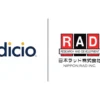The era of seamless travel has arrived: SITA’s Digital Travel Credential isn’t just a better way to travel and cross borders, it’s a symbol of a new era in privacy-preserving, trustworthy digital interaction.
By Trevor Butterworth
The promise of digital interaction is that it can be frictionless, instantaneous, and effective. To fulfill this promise, technology must bridge the gap between a world built on paper and one navigated with mobile devices — and that crossing must be effortless and trusted. On the other side of paper is a world of seamless navigation, seamless processes, seamless trust.
That world starts in Aruba.
The island has stepped up to the challenge of digital transformation by embracing decentralized identity technology to build that bridge to seamless experience. And it starts with travel. Solidifying its reputation, in terms of digital innovation, as the Estonia of the Caribbean, the tourism-dependent island is working with SITA, the global leader in IT for air travel, to make visiting the island seamless.
The decision was built on a series of successful trials that culminated, in March this year, with a global first: air travelers were able to seamlessly cross an international border using a Digital Travel Credential (DTC) backed by a blockchain. Before leaving for the airport, passengers scanned their passports, rendering the information in a way that allowed it to be shared for border crossing ahead of travel. The 100 percent success rate in this trial led to the announcement at the ICAO Trip Conference in Montreal on September 12 that the government of Aruba is now exploring how to implement the DTC technology island wide.
Ultimately, a DTC would allow visitors to automatically check in to their hotels, access their hotel rooms, rent cars, and basically accomplish everything they need to do on vacation with a swipe or a scan of a mobile device. As Andrew Hoo, Director of Immigration for the Government of Aruba put it: “We want to use this technology so that visitors will never forget they are on vacation when they arrive on the island.”
But a DTC also benefits airlines by radically simplifying the check-in process, freeing up airport space, reducing lines, and providing an authoritative way to verify that everyone boarding a flight for an international destination is legally permitted to arrive in the destination country. Similar travel credentials, such as a boarding pass verifiable credential, can also be used to manage lounge access and provide additional services through the rich communications features of verifiable credentials. In addition, the DTC can also be used to enable a complete biometric experience using high quality passenger data.
Built in partnership with Indicio and following the International Civil Aviation Organization’s (ICAO) standards for a digital travel credential, the DTC uses decentralized identity technology to verify the authenticity of the data in a person’s passport without that data having to be stored, managed by a third party, or shared through a direct integration.
In doing all this, decentralized identity technology provides the bridge from the world of paper documentation to digital devices by creating verifiable data that can be held by a person, organization or thing. Both the source of the data and the integrity of the data can be verified without the data itself having to be held and checked by a third party or shared directly between databases.
When combined with passengers holding their data in a verifiable credential like the DTC, this eliminates data privacy issues and provides people with a genuine way to consent to sharing personal data. (If you’re new to this technology, see our “Beginner’s Guide to Decentralized Identity” for a full, easy-to-follow explanation of how it works.”)
The result? A traveler can, effectively, cross a border while still at home on their couch, speeding up the current process of border crossing, according to Jeremy Springall, SITA Senior Vice President for Border Management, by 90 percent. As Edwin Kelly, Director General of the Department of Civil Aviation in Aruba, put it in the same article, “no lines.”
A world of no lines and seamless data sharing beckons. Indicio is implementing seamless solutions using the open-source decentralized identity technology behind the DTC wherever high value data needs to be trusted. As Indicio CEO, Heather Dahl puts it, “immediately verifiable data is the bridge to a new digital era. The ability to trust that who you are interacting with is who you believe you are interacting with, and whether the data they present can be trusted, have been holding back innovation, trapping us in processes and systems that are inefficient and insecure and, above all, costly. With this technology, cost-efficient digital transformation is here — and it is going to change everything.”






